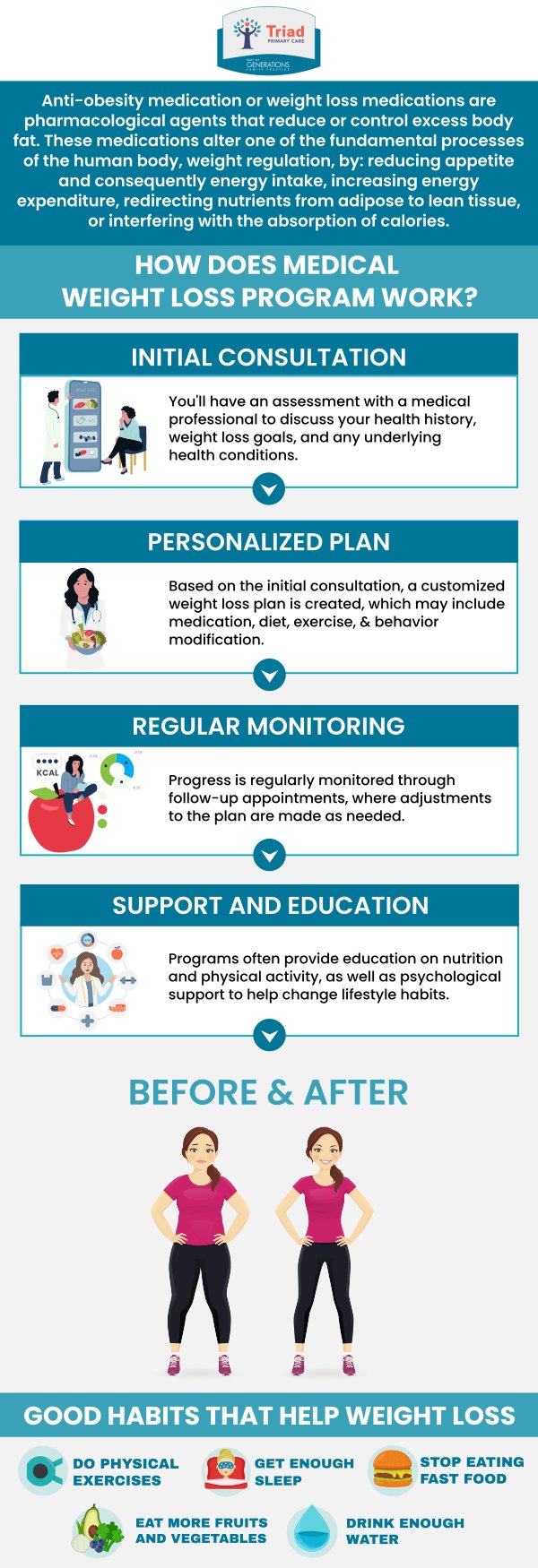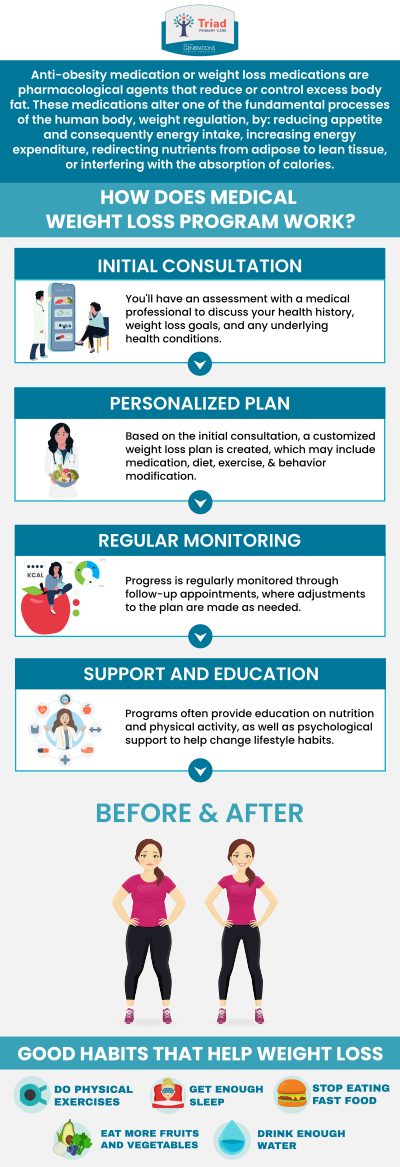Why Is Weight Loss More Difficult After 45?
Weight loss becomes more difficult after 45 due to changes in metabolism, hormone levels, and muscle mass. As we age, our body’s ability to burn calories slows down, and hormonal shifts can lead to weight gain, especially around the abdomen. Our team offers personalized weight loss plans at Triad Primary Care to help you overcome these challenges and achieve your health goals. For more information, contact us or book an appointment online. We are conveniently located at 1309 Lees Chapel Rd., Greensboro, NC 27455.


Aging presents lots of challenges, particularly for your health and wellness. Making important changes to your habits and lifestyle can help you manage your weight and reduce your risk of weight-related problems.
At Triad Primary Care, our team helps patients of all ages achieve healthy weight loss and maintain their results with medical weight loss featuring healthy eating plans, lifestyle guidance, nutritional supplements, and medication as needed. If you’re struggling with losing weight, here are eight reasons why your age could be to blame.
1. Your metabolism slows down
Metabolism refers to how your body converts the foods and drinks you consume into energy your body can use. As you get older, your metabolism slows down, which means you don’t burn calories as efficiently.
As a result, you can wind up gaining weight more quickly and more “easily” than you did when you were younger. It also becomes harder to lose weight and keep it off. Worse, whatever weight loss methods worked for you when you were younger may no longer be effective as you age.
2. You lose muscle mass
In addition to a slower metabolism, age also causes a loss of muscle mass. In fact, we begin to lose muscle mass at about age 30, with more rapid loss at around age 60 and beyond. Muscle tissue burns calories faster than other tissues, which means as we lose muscle, our ability to lose weight also diminishes.
3. Your hormones change
Hormones aren’t just about reproduction. These chemicals play key roles in lots of functions, including metabolism and appetite regulation. As we get older, declines in hormones like estrogen and testosterone make it more challenging to lose weight, particularly for women as they get closer to menopause.
4. You’re not as active
It’s not just physiological changes that make weight loss more difficult as we age. Changing lifestyle habits also play a role, particularly an increase in sedentary or inactive behaviors. Busy schedules, family and social responsibilities, and increased fatigue can all contribute to being less active, along with a loss of muscle tissue.
5. You’re more stressed out
Psychological factors are also important for weight management. Many people find their jobs or other responsibilities lead to greater stress, along with issues like anxiety or depression. These problems can lead to emotional eating, unhealthy cravings, and binge eating, along with increasing feelings of fatigue that make it hard to exercise.
6. You’re not sleeping as well
Sleep problems are common among older people. Poor quality sleep and consistently sleeping fewer than 7-9 hours per night interfere with your hormones and your metabolism, making it harder to drop those pounds and keep them off.
7. You have insulin resistance
As you age, your body becomes less sensitive to insulin, a hormone that regulates blood sugar (glucose). This is a condition called insulin resistance, and it can lead to weight gain and difficulty losing weight, as well as raising your risk of type 2 diabetes.
8. You have chronic diseases
Aging also increases your risk of chronic diseases like arthritis, diabetes, and thyroid disorders. These diseases can interfere with weight loss by changing your metabolism, altering hormone levels, or making it more difficult to stay physically active. In some cases, medication taken to manage your disease can lead to weight gain or fatigue as well.
If you’re struggling with weight management, we can help. To find out how, request an appointment online or over the phone with us at Triad Primary Care in Greensboro, North Carolina, today. We are conveniently located at 1309 Lees Chapel Rd., Greensboro, NC 27455. We serve patients from Greensboro NC, Browns Summit NC, McLeansville NC, Oak Ridge NC, Summerfield NC, and surrounding areas.
Check Out Our 5 Star Reviews



Additional Services You May Need
▸ Covid-19 Testing
▸ Medical Weight Loss
▸ Physical Exams
▸ Addiction Treatment
▸ Primary Care
▸ Lab Testing



